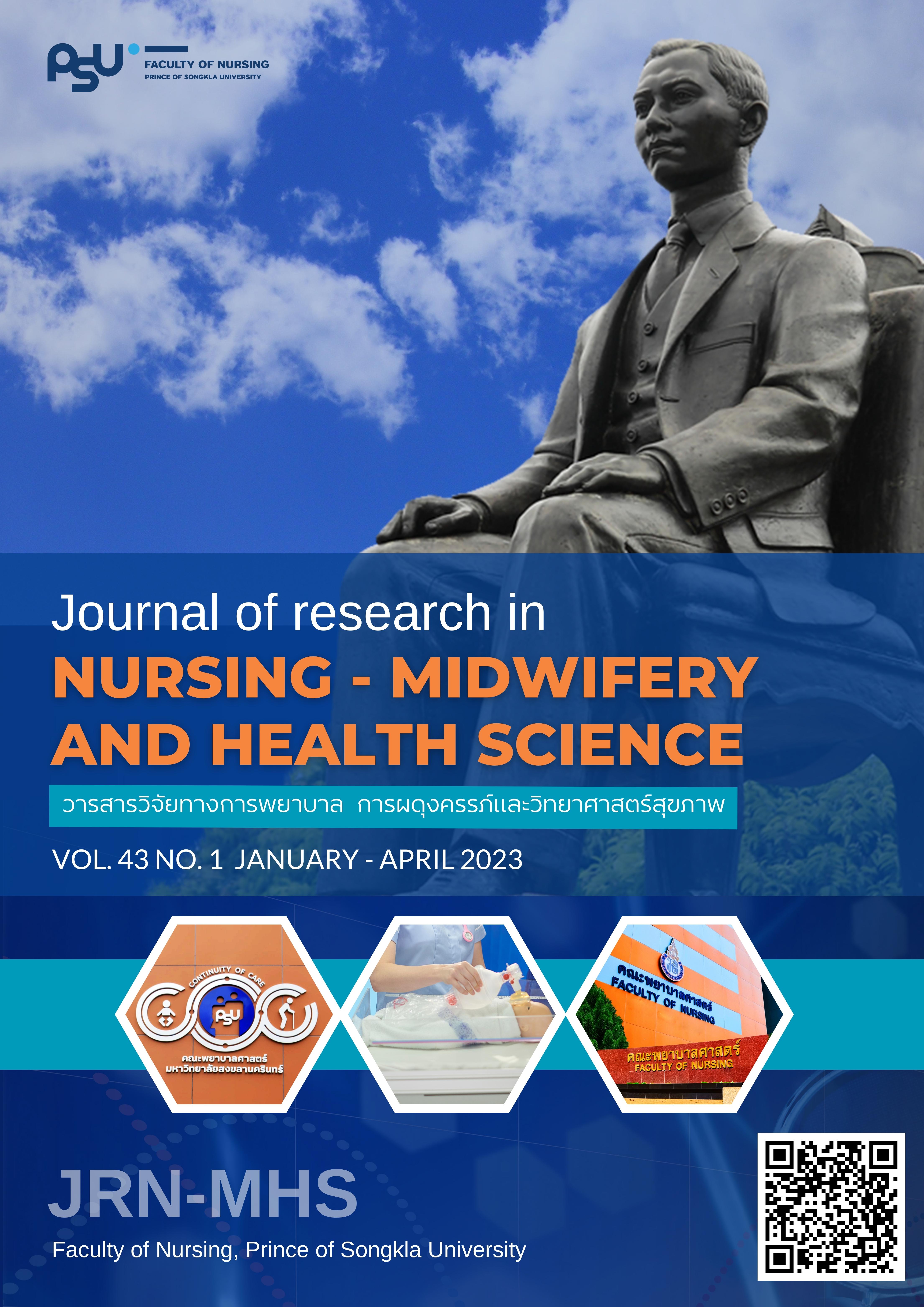ผลของสื่อวีดิทัศน์การสอนเรื่องการตรวจสภาพจิตร่วมกับการเรียนรู้ โดยใช้กรณีศึกษาต่อความรู้ ความมั่นใจและความพึงพอใจของนักศึกษาพยาบาลหลักสูตรพยาบาลศาสตรบัณฑิตในรายวิชาปฏิบัติการพยาบาลสุขภาพจิตและจิตเวช
Main Article Content
บทคัดย่อ
วัตถุประสงค์: 1) ศึกษาประสิทธิภาพของสื่อวีดิทัศน์การสอนออนไลน์เรื่องการตรวจสภาพจิต (MSE-VDO) 2) เปรียบเทียบความรู้ และความมั่นใจในการตรวจสภาพจิตผู้ที่มีปัญหาสุขภาพจิตระหว่างนักศึกษาพยาบาลกลุ่มที่ใช้ MSEVDO ร่วมกับการเรียนรู้โดยใช้กรณีศึกษากับกลุ่มที่ได้รับการสอนแบบปกติ และ 3) ศึกษาระดับความพึงพอใจการใช้ MSEVDO กลุ่มตัวอย่าง คือนักศึกษาพยาบาลชั้นปีที่ 3 ในรายวิชาปฏิบัติการพยาบาลสุขภาพจิตและจิตเวช วิธีการ: การวิจัยกึ่งทดลองแบบสองกลุ่มวัดผลก่อนและหลังการทดลอง คัดเลือกกลุ่มตัวอย่างด้วยวิธีการสุ่มแบบง่าย โดยกลุ่มทดลอง 30 ราย เข้าชม MSE-VDO ผ่านทางระบบเฟซบุ๊ก (Facebook) ร่วมกับการเรียนรู้โดยใช้กรณีศึกษา ส่วนกลุ่มควบคุม 23 ราย รับการสอนตามปกติ วิเคราะห์ข้อมูลโดยใช้สถิติเชิงพรรณนา Wilcoxon Signed Rank Test และ Mann-Whitney U test ผลการศึกษา: 1) ประสิทธิภาพของ MSE-VDO ได้ 78.5/81.3 (สูงกว่าเกณฑ์ 75/75) 2) ค่ามัธยฐานคะแนนความรู้และความมั่นใจในกลุ่มทดลองหลังเรียนรู้ด้วย MSE-VDO สูงกว่าก่อนเรียนรู้ อย่างมีนัยสำคัญทางสถิติ (Z = -2.47, p < .01 และ Z = -4.42, p < .01) 3) เปรียบเทียบค่ามัธยฐานคะแนนความรู้และความมั่นใจระหว่างกลุ่มทดลองและกลุ่มควบคุมหลังทดลอง พบว่ากลุ่มทดลองมีระดับความรู้ และความมั่นใจมากกว่ากลุ่มควบคุมอย่างมีนัยสำคัญทางสถิติ (U = 201, p < .01 และ U = 236, p < .05) และ 4) ความพึงพอใจของนักศึกษาที่ใช้ MSE-VDO 3 ด้าน (เนื้อหา รูปแบบ/การนำเสนอประโยชน์) อยู่ในระดับมาก (Mean (SD) = 3.99(6.67); 4.03(0.74); 3.93(0.70)) สรุป: สื่อ MSE-VDO ร่วมกับการเรียนรู้โดยใช้กรณีศึกษาสามารถใช้เป็นต้นแบบในการเพิ่มความรู้และความมั่นใจของนักศึกษาในการตรวจสภาพจิตได้การศึกษาครั้งต่อไปเสนอแนะให้วัดผลซ้ำและเพิ่มขนาดกลุ่มตัวอย่าง
Article Details

อนุญาตภายใต้เงื่อนไข Creative Commons Attribution-NonCommercial-NoDerivatives 4.0 International License.
เอกสารอ้างอิง
Seeherunwong A, Kumpalasiri N. Mental health mental illness and factors related to psychiatric nursing. In: Seeherunwong A, Yuttatri P, Kaesornsamu P, et al, editors. Psychiatric Nursing. Bangkok, Saryturagit; 2014. Thai.
Royal Thai Government Gazette. Announcement of the Nursing Council on core competencies of graduates with bachelor’s degrees, master’s degrees, doctorate degrees in nursing [Internet]. Nonthaburi: Royal Thai Government Gazette 2008 [cited 2021 Nov 4]. Available from: https://www.tnmc.or.th/images/userfiles/files/004.pdf
Smitishtrira P, Imsorn P. The effects of using case study as a teaching learning method in the subject of psychiatric nursing 2 on critical thinking ability and learning achievement of the third year students, Saint Louis College. education journal. 2014; 42(3): 39-55. Thai.
Theinkaw S, Tunprapussorn K. Nursing student’s perspectives on authentic learning in the course of nursing care of persons with mental health problems. Songklanagarind J Nurs. 2018; 38(3): 127-40. Thai.
Chaleoykitti S, Chiewsothorn S, Nuyleis Y. The development of an innovative learning method with augmented reality applications on smartphone. Rama Nurs J. 2019; 25(1): 6-15. Thai.
Injui R, Chiewsothorn S, Nuilers Y. Development of virtual reality program in managing aggressive patients. JRTAN. 2021; 22(1): 100-17. Thai.
Wilson R, Hungerford C. Mental health education and virtual learning environments (VLEs) in pre-registration nursing degrees: Follow the Leaders?. Issues Ment Health Nurs. 2015; 36(5): 379-87. doi: 10.3109/01612840.2014.1002647.
Duan Y, Li Z, Wang X, et al. Application of online casebased learning in the teaching of clinical anesthesia for residents during the COVID-19 epidemic. BMC Med. Educ. 2021; 21(609): 1-7. doi: doi.org/10.1186/s12909-021-03047-2.
Kanhadilok S, Punsumreang T, Malai C. A design of case based learning for promoting learning outcomes in practicum. Songklanagarind J Nurs. 2019; 39(4): 129-37. Thai.
Willims B. Case based learning-A review of the literature: Is there scope for this educational paradigm in prehospital education?. Emerg Med J. 2005; 22(8): 577-81. doi: 10.1136/emj.2004.022707.
Punsomreung T, Kanhadilok S, Prasertsri R, et al. Effects of case based learning and simulation based learning on students’ perceptions of clinical judgment and students’ clinical judgment. JONAE. 2021; 14(1): 14-32. Thai.
Ornlaor S, Wattana S, Apinyalungkon K, et al. Effects of a case-based learning on clinical decision making among nursing students. SCNJ. 2022; 9(1): 69-80. Thai.
Bandura A. Social foundations of thought and action: A social cognitivetheory. Englewood Cliffs, NJ: Prentice-Hall; 1986.
Bandura A. Self-efficacy: The exercise of control. New York: Freeman; 1997.
Faul F, Erdfelder E, Lang AG. G*Power 3: A flexible statistical power analysis program for the social, behavioral, and biomedical sciences. Behav Res. Methods. 2007; 39(2): 175-91. doi: 10.3758/bf03193146.
Sinthuchai S, Ubolwan K, Boonsin S. Effects of highfidelity simulation based learning on knowledge, satisfaction, and self-confidence among the fourth year nursing students in comprehensive nursing care practicum. RNJ. 2017; 23(1): 113-27. Thai.
Jungpanich A, Srisailaun O. Effects of using daily care plan video teaching on clinical self-confidence and satisfaction of nursing students, Kuakarun Faculty of Nursing, Navamindradhiraj University. KJN. 2015; 22(1): 17-34. Thai.
Cohen J. Statistical power analysis for the behavioral sciences. 2 nd ed. Hillsdale, NJ: Erlbaum; 1988.
Silpcharu T. Research and statistical analysis with SPSS and AMOS. 7 th ed. Bangkok: Business R&D; 2017. Thai.
Buatchum K, Chetchaovalit T, Christraksa W, et al. The effect of knowledge provision on perceived self-efficacy in psychotic screening of village health volunteers. Songklanagarind J Nurs. 2018; 38(2): 33-42. Thai.
Silanoi L, Chindaprasert K. The use of rating scale in quantitative research on social sciences, humanities, hotel and tourism study. JMS-UBU. 2019; 8(15): 112-26. Thai.
Komonwipast N, Pakdevong N. A development of e-learning courseware media of BNS 408: Law and professional ethics for student’s readiness of nursing licensing examination. APHEIT SOCIAL SCIENCE. 2015; 4(1): 7-17. Thai.
Srisatidnarakul B. Development and validation of research instrument: Psychometric properties. Bangkok: Chulalongkorn University; 2012. Thai.
Brahmawong C. Developmental testing of media and instructional package. SERJ. 2013; 5(1): 5-20. Thai.
Nonthamand N. Planning of video production in digital age. ect journal. 2019; 16(1): 35-53. Thai.
Siricharoenwong K, Mataputana M, Sawangjid S, et al. Development and effectiveness of video media to knowledge, self-confidence and satisfaction of nursing students in preparation for children and adolescence care practicum experience. JHNR. 2021; 37(1): 218-29. Thai.
Sanongdej W, Wangpitipanit, S, Chonsin P, et al. Development and effect of video media combined with scenario on knowledge and self-confidence in practice of occupational health nursing for nursing students. Rama Nurs J. 2018; 24(1): 94-107. Thai.
Khamrath J, Ritudom B. Effects of the readiness of nursing practice in adult nursing practicum 1 on knowledge and confident in nursing practice among air force student nurses, academic year 2018. Royal Thai Air Force Medical Gazette. 2019; 65(3): 45-53. Thai.
Sarobon T, Boonlue N, Chomchan S, et al. Development of multimedia’s therapeutic communication in psychiatric nursing. JMND. 2020; 7(12): 252-63. Thai.


